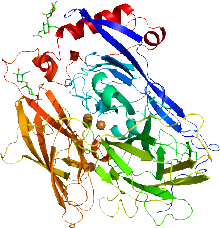| acetylindoxyl oxidase | |||||||||
|---|---|---|---|---|---|---|---|---|---|
| Identifiers | |||||||||
| EC no. | 1.7.3.2 | ||||||||
| CAS no. | 9029-37-2 | ||||||||
| Databases | |||||||||
| IntEnz | IntEnz view | ||||||||
| BRENDA | BRENDA entry | ||||||||
| ExPASy | NiceZyme view | ||||||||
| KEGG | KEGG entry | ||||||||
| MetaCyc | metabolic pathway | ||||||||
| PRIAM | profile | ||||||||
| PDB structures | RCSB PDB PDBe PDBsum | ||||||||
| Gene Ontology | AmiGO / QuickGO | ||||||||
| |||||||||
Acetylindoxyl oxidase (EC 1.7.3.2) is an enzyme that catalyzes the chemical reaction
- N-acetylindoxyl + O2 N-acetylisatin + (?)
Thus, the two substrates of this enzyme are N-acetylindoxyl and oxygen, whereas its product is N-acetylisatin.
This enzyme belongs to the family of oxidoreductases, specifically those acting on other nitrogenous compounds as donors with oxygen as acceptor. The systematic name of this enzyme class is N-acetylindoxyl:oxygen oxidoreductase. This enzyme participates in tryptophan metabolism.

